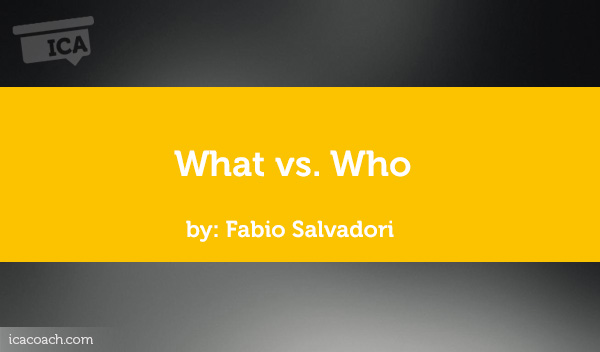
A Coaching Power Tool Created by Fabio Salvadori
(Innovation Coach, ITALY)

Roads were made for journeys, not destinations. — Confucio
So, you did all the work, and you’ve finally identified your S.M.A.R.T. goal. Now that you know where you want to go and when you want to be there, it’s time to plan how to reach your destination.
What do I have to do, to achieve my goal?
A perfect action-oriented question, indeed. The answer will include the list of steps to take, resources to acquire, supporting structures to create, and things that must happen to get you where you want. A SMART goal, a clear plan, and your commitment are all signs pointing to a successful journey.
But, before you start moving towards your destination, may I invite you to pause for a moment of reflection?
The first question that pops into my mind is “ how much control do you have on your environment, on the world around you? ”. Life is unpredictable, now more than ever, so a lot of things will happen in your environment that are outside your control. And they can take you in unexpected directions. Sure, you can take into account the impact of some external factors in your plan but this will make it complicated, hard to follow and in such an uncertain scenario, you will never be safe from disruptions. How would you react if something unexpected, positive or negative, happens on your journey?
A second question is about the goal itself, or better about your focus. Where is your attention? I am sure that the “action-oriented” approach described before will lead and hold your gaze straight on the destination. And don’t get me wrong, this is extremely valuable, even necessary, to achieve your goal. However, it may also trick you into forgetting to enjoy the journey. In the end, once a goal is reached, it soon becomes part of memories. What will remain with you, once you reached your goal?
What you get by achieving your goals is not as important as what you become by achieving your goals. ― Henry D. Thoreau
Before you head out for your goal, allow me to challenge you to consider a different perspective. Instead of asking what do you have to do, try asking yourself a different question.
Who do I have to become, to achieve my goal?
This question aims to shift your focus outside-in; from extrinsic rewards to intrinsic motivation, from the external actions to your internal growth, from the doing to the being. What mindset do you need to develop? What skills and knowledge do you need to acquire? What strengths do you need to reinforce and what edges do you need to smooth?
There are a few benefits in starting from the “ who ”.
Self empowerment
The journey, — or the work itself — is all there is.
Results may come at the end, but you can’t control them. What you can control are your behaviours, your actions, your mindset and, in the end, your growth. Being focus on YOU will help you to fall in love with the journey. It will support you in being disciplined and flexible at the same time. Circumstances may change along the way, but because your focus is on YOU, you will be able to adapt and move forward.
Results may change, but success is inevitable.
Success is inevitable
According to the dictionary, success is the accomplishment of an aim or purpose . If your purpose is your transformation, then, no matter the results, you will succeed.
The good news is that results will come, too. They may be different to what you planned, but they will come.
As Viktor Frankl wrote in his book “Man in search for meaning”, what matters is to make the best of any given situation . If you start from the “who”, that “best” is the best of the situation itself, the results, but also the best of you, through learning and growing. In any case, you will be successful.
Long-lasting transformation
Give me six hours to chop down a tree, and I will spend the first four sharpening the axe. — Abraham Lincoln
The 7th principle of Stephen R. Covey , invites us to “Sharpen the Saw”. It means preserving and enhancing the greatest asset you have; YOU. At the end of the journey, you won’t have only achieved your goal. You’ll have developed true mastery that will allow you to go even farther.
Intrinsic motivation vs Extrinsic reward
The reason that people do things, especially heroic or major things, things that take a lot of effort, is because they care. — Dave Gray
When you ask yourself “who do I need to become, to get where I want?” you are turning your look inward. Not to linger over your past but to explore your potential to move forward. It will help you in unveiling the emotions connected to your goal and use them to infuse your journey with a purpose. The more emotionally engaged with the objective you are, the more you will care about it. The fuel propelling you forward will arise from your intrinsic motivation and not from some extrinsic rewards you can’t fully control.
Coaching application
I believe this change in perspective can help both me, as a coach, and my clients.
Creating a rewarding and sustainable coaching career is indeed a challenge. Launching a coaching business, as for any other businesses, can be daunting if we analyse the many circumstances outside our control. For this reason, from the very beginning, I decided to focus more on becoming a coach than on creating a career as a coach. This shift in perspective has removed a lot of my fears because I’m less focused on the end result and more on my growth. I know the direction, and I love the journey. I’m confident that it will take me somewhere amazing.
In the same way, helping our clients to shift their focus from the results to their transformation, will help them create a stronger bond with their goals at the emotional level. And the final success will be much more significant than the achievement of their goals. They will unleash their full potential and create a long-lasting transformation. All of this with a question.